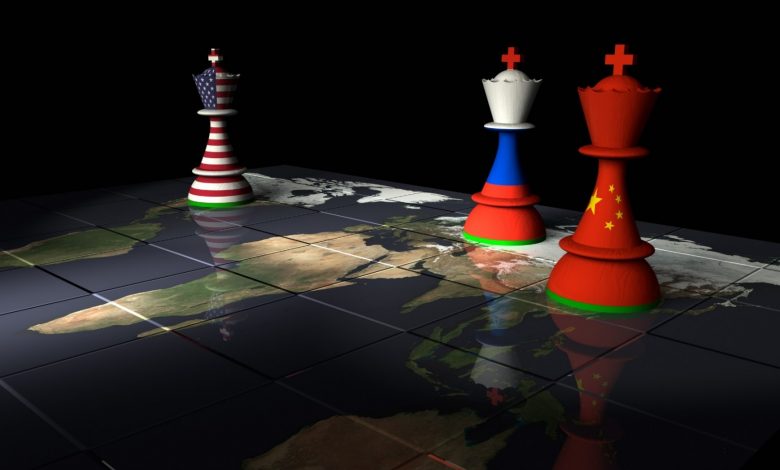Analysis: The paradox of technological great power competition

Policymakers increasingly believe that technological dominance is key to maintaining American supremacy over China and securing democratic values—but these technologies pose a separate threat to liberalism.
A familiar story has been written these past few years: great power competition, once imagined by some to be a thing of the past, has re-emerged, this time between the United States and China. This competition, which spans military, economic, diplomatic, and political domains, is about the character of world order and the values upon which it is built.
A major chapter of this story concerns technology. The fourth industrial revolution, as embodied in the full range of innovations occurring in artificial intelligence (AI), quantum science applications, biotechnology, and the like, is increasingly viewed as the locus of great power competition. Emerging technologies are often seen as key to achieving the edge in this contest, for example, in military affairs or geopolitics. Some suggest entrenching both democratic values and technological superiority through an alliance of techno-democracies, while both are under threat by an authoritarian China.
The core of this story is accurate—great power competition and a contest over world order is occurring between the United States and China.
But few—even those who disagree on the extent to which technology influences the trajectory of great power competition—have realized the secondary challenge posed by these technologies: emerging technologies are posing an existential challenge to the distinctiveness and uniqueness of individuals.
With this threat to the meaningful expression of human individuality comes a threat to the legitimacy of liberal values, which extoll the individual’s free, creative powers and their rightful desire for self-governance and freedom of thought and expression. Why bother with these lofty ideals when it appears that humans are being actively disempowered by technology?
This does not occur in a vacuum. Indeed, it will occur in democratic societies that see these very technologies as key to defeating authoritarian great power adversaries. This paradox may come to define the new technological era as much as the contest between liberal and authoritarian values.
Technological Competition
Mohammed Soliman, director of the Cyber Security and Emerging Technology Program at the Middle East Institute, recently explained in the National Interest that technology “is where national interest, human progress, education, innovation, culture, and economic development converge.” It is this convergence that enables technology to influence geopolitics. China’s technological ambitions—codified in policies such as “Made in China 2025” and its “New Generation Artificial Intelligence Development Plan”—reflect the belief that emerging technologies and high-tech manufacturing are key to the twenty-first century, spurred in part by the successes of AIs like AlphaGo.
These technologies are systematically used to implement China’s authoritarian system of governance. They enable mass and targeted surveillance and are exported by China to like-minded states to replicate these practices abroad, effectively spreading authoritarian values for international social control.
People’s Liberation Army (PLA) officials have debated whether AI is allowing warfare to evolve toward a new phase of “intelligentization,” in which military modernization places a heavier emphasis on AI-enabled military technology and autonomous systems in combat, perhaps more conducive to “the PLA’s distinctive strategic, command, and organizational culture.” The role of emerging technologies in a potential war over Taiwan is kept in focus. Taken together, these factors suggest China is developing emerging technologies with authoritarian ends in mind and is actively seeking to make a “world safe for autocracy.”
Here enters Jared Cohen and Richard Fontaine’s proposition that a group of democracies, dubbed the T-12, coordinate on multilateral technology policy to entrench the values of liberal states while they are under assault. Later calls from Ilan Goldenberg and Martijn Rasser include emphases on aligning strategic perspectives on China, harmonizing regulatory regimes on investment and export controls, and deepening technological and economic cooperation.
Great power competition is here, and technology is its lode star. But is the authoritarian use of emerging technologies by great power competitors the only threat that fourth industrial revolution technologies pose to democracy and liberal values?
The Technologists’ Story
While it has become familiar to say that uses of technology like cyberattacks threaten democracy, these are not the threats to liberal values I am highlighting here.
Rather, there have been technological breakthroughs in recent years that, whatever their merits or flaws, have induced bursts of awe or fear. These are laying the groundwork for an impending challenge to individuality that democratic citizens are merely tolerating, not confronting.
Here, especially in AI, some have been writing their own story, one that might begin with the debut of the large language model GPT-3 (though, one could go further back to AlphaGo). GPT-3 caused a major splash for its ability to write anything from songs to essays in a human-like manner. A representative example comes in a September 2020 essay in The Guardian “written” by GPT-3 itself. Speaking on another large language model, LaMDA, in June 2022, Google fellow Blaise Agüera y Arcas suggested “AI is entering a new era” and is moving towards “consciousness.” These models’ debuts were watersheds in technological existentialism.
Using the successes of these language models, OpenAI developed the text-to-image generators DALL-E and DALL-E 2 which take users’ input phrases and transform them into what can be described as AI-generated artwork. Meta’s text-to-video soon followed. These triggered another burst of technological existentialism. This time, the old maxim that emerging technologies would put human, manual labor out of work was flipped on its head, as the individuality of artists appeared under threat
AI is just one emerging technology, though it packs a punch. Gene editing and synthetic biology carry their own implications for individual meaning. The ability to edit human genes—while currently highly limited—will raise another threat to individual distinctiveness by toying with human nature directly, rather than indirectly through potential competitors such as AI systems.
Even the seemingly innocuous Internet of Things and the construction of “smart systems” make the human need for “perception, dexterity, and flexibility” redundant, as professor Shuo-Yan Chou observes. The threat to liberalism lies in individuals’ perceptions as lesser parts of a greater whole.
There’s a challenge deceptively packaged as a promise in all this: after the “economic disruptions” caused by emerging technologies, life will be streamlined, comfortable, and straightforward.
The Technological Paradox
These examples are microcosms of what to expect as technology continues to be either created or evaluated, however accurately, in the image of human abilities or values. These sporadic bursts of awe, fear, and frustration, only to be subdued until the next technological breakthrough, are largely confined—for now—to technologically niche circles. But this will not last forever.
As the United States, its allies, and China both see the fourth industrial revolution as the direct path to commanding the twenty-first century, each will pursue dominance in the research, development, and regulation of these technologies. While the United States and other democratic states may attach restrictions on, for example, biometrics and facial recognition systems (in contrast to Chinese surveillance techniques), these countries will all see a diffusion of advanced technologies and the rapid integration of them in their daily lives.
The real paradox of technological great power competition is this: as this diffusion occurs, and these examples of AI demonstrations move from microcosms of existentialism to the larger scale, the power of individual creativity and meaning, and the value of being free to express it, will become increasingly challenged. This should be considered a potential form of “societal disruption.”
Yet, some argue that maybe humans and machines will instead act as “collaborators, not competitors.” Rather than envisioning a competition between AI and humans, economics and technology scholar Erik Brynjolfsson “believes that shifting our focus to envision ways that AI can work alongside people will spur innovation and productivity while unlocking economic benefits for everyone.” This argument, however, misses the point.
Emerging technologies do not need to reach the fullest, loftiest potentials that proponents of the fourth industrial revolution like Klaus Schwab envision (and critics, like researcher Alexander Trauth-Goik view as business-oriented, linear timelines of technological innovation) for them to threaten individuality and liberal values.
The problem is two-sided. First, individuals perceive these technologies as altering the distinctiveness of human abilities—this is why Lee Sedol, defeated by AI AlphaGo, retired with his grim admission that “even if I become the number one, there is an entity that cannot be defeated.” AlphaGo does not actually have to possess human-like intelligence but it is currently perceived this way.
Second, while individuals perceive this attack on human distinctiveness, they are told that, once the economic dust has settled, life will be longer, healthier, more efficient, and freer because of these technologies. But this may no longer be desirable to them.
Previously, I pointed to the work of Galileo and Newton as emblematic of a remarkable shift in human-nature relations as a reference point for the fourth industrial revolution. Why? Not so that we could all become experts in physics or philosophy, but to highlight that the current paradox is not just an intellectual problem; it’s also a human one. We can’t intellectualize our way out of social instability and threats to the legitimacy of liberal values.
What can be done?
First, do not throw away technological competition. This paradox cannot be solved by removing one of its legs. The United States and its allies must confront the authoritarian uses of technology and the importance of dominating this arena. But they must be aware that each of them will be indirectly encouraging a domestic threat to the same values they are prioritizing in their competition with China.
Second, free individual choice still matters. It is the first step taken in taming this latest juncture in relations between people and the world. Despite our admiration for Galileo’s and Newton’s genius in retrospect, their choices to accept the bizarre nature of reality enabled their genius to thrive. Such choices are painful and counterintuitive but they will need to be made about the technological great power paradox in the years ahead. We should recognize now that they should not be easy nor painless, or coerced.
Third, be aware that the extremes of techno-optimism and techno-pessimism are harmful to liberal values. Faith that AI or biotechnology, for example, will so radically transform our lives as to make our present choices negligible means that most have little to do except wait. Faith that these technologies will physically or spiritually destroy us, by their natures, means we are so weak and fragile in the face of our own creations that our choices may as well mean nothing.
The Biden administration does not view everything technology-related as defined by America’s competition with China. The White House Office of Science and Technology Policy AI Bill of Rights, for example—whatever its flaws—has no reservations about taking a fine-grained regulatory approach to sectors including health, labor, and education.
But as emerging technologies are delinked from the rest of the United States’ economic relationship with China, and we continue to deepen a “technological Cold War,” it is necessary—alongside regulatory efforts—to begin a new conversation on the relationship between rights and responsibilities in technology-leading democratic societies like the United States. At repeated points, individuals in these societies will decide whether they value their roles in these new technological arrangements. It will hurt less to have this conversation sooner rather than later.





